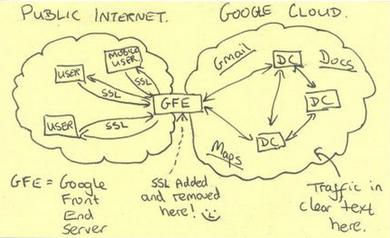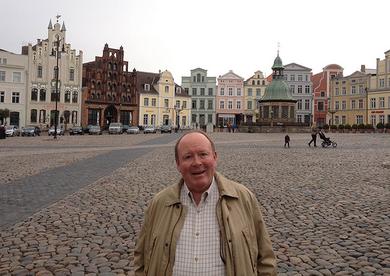|
NSA has been illegally copying all internal Google and Yahoo traffic. Apparently Google’s move to encrypt their internal traffic was well motivated. But what’s really astonishing is the slide from NSA explaining the program. Yes, it’s a fucking smiley face. “Lol 4th amendment jk”. There’s been so many revelations about NSA’s spying this summer it’s hard to make sense of the big picture. But for me, there’s two big things. One: NSA is wholly (and illegally) spying on US citizens in direct violation of their mandate and the Constitution. Two: NSA is remarkably competent at spying, using big data and Internet technologies effectively. A competent spy agency with no effective public oversight fundamentally threatens American freedoms. Ken and I just took a nice trip to Germany, focussed mostly on the northeastern corner on the Baltic Sea. Lovely trip, very mellow, here’s a bunch of photos. The biggest revelation for us was the Baltic sea resorts, 19th century spas and hotels. We started our trip on Rügen, a relaxing quiet island. The town of Binz has a terrific collection of nice hotels and restaurants. Also nearby is Nationalpark Jasmund with its famous chalk cliffs, the bizarre Prora (a facist beach resort built in the 30s), and the Rasender Roland beach steam train. But the best Baltic sea experience was a last minute decision to go to the Grand Hotel Heiligendamm and its amazing gourmet restaurant Friedrich Franz. Really lovely overnight, fantastic cooking. Heiligendamm is interesting for being one of the first ever beach resorts, founded in 1793 and popular with various royalty. Up to and including the G8 summit in 2007. Also another steam train, the Molli Bahn. Just a terrific place all around, worth planning a stay if you’re in the area. Beyond the resorts we visited various Hanseatic towns: Rostock, Wismar, Stralsund, Lübeck. And a trip down to the lake region to Schwerin. Lots of beautiful brick buildings dating from a wealthy past in the 15th-17th centuries. Of the places I liked Lübeck and Schwerin the best, combining charming town centers with some lively modern life. The trip was bookended by visits to Berlin and Hamburg. Berlin is amazing, particularly right now since its relatively low cost of living has attracted a vital core of artists and entrepreneurs. I think we may try to go back to spend a month living there next year. Hamburg is also quite pleasant for a visit, I think it’s a city that would reward settling in and exploring a bit. Every time I travel I refresh my apps designed to be used when the iPhone is offline. These apps all cache data so I can use Wikipedia or a map without a WiFi or cellular connection. I started doing this because international roaming data was so expensive but the apps are now good enough that I think I will use them even when I’m home. Cached data = fast! Here’s the best of the lot, I believe all these apps are available both for iOS and Android. ForeverMap 2: OpenStreetMap. Download a few hundred megabytes and have a map of a whole country in your pocket. Routing too! Map data quality varies based on OSM coverage (it’s great in US and most of Western Europe). The rendering and usability of the app is fantastic. They also have a turn based navigation program I haven’t tried. I’m amazed Apple hasn’t yet bought Skobbler to help fix their maps problem. Wiki Offline: Wikipedia. Download 4GB of English Wikipedia once, read forever. The formatting is finally good enough that most articles come through unscathed. Only thing missing is the pictures. Being able to wikidive without waiting for network is terrific. Triposo: travel guides. Triposo scrapes open data sources like Wikipedia, Wikitravel, OSM, and Flickr and then compiles it into a usable offline travel guide on your phone. It’s great for answering the question “what are the three things I should see in this town, and where should I have lunch?”. Ascendo dictionaries. There's a zillion low quality free translation dictionaries out there, this one seemed to have a decent German database and work well offline. I’ve been in Berlin for the past few days, having a great time. But also a bit bleak, it’s hard to be in Berlin without seeing the awful German history of the 20th century. The Holocaust, the division of Berlin, the Stasi, the people murdered trying to cross the Wall. It’s inescapable. What I admire is how directly the German state seems to engage with its evil history. There are museums and monuments everywhere, from small plaques at the former homes of Jews who were deported and murdered to reminders of the Wall to state funded museums like the Topography of Terror. The tone of the presentations (at least in English translation) is forthright and neutral. So all you see is an unvarnished explanation of how the Third Reich inventoried and killed millions of people. No attempt to explain or contextualize the act, certainly not to justify it, not even color commentary on how horrible it was. Just meticulous, detailed documentation of the terrible crimes of the Holocaust. It feels like an honest attempt to understand and account for the past crimes of German governments. By presenting things so directly it becomes impossible to explain it away as some aberrant past, some temporary mania, the inexplicable actions of others. They are saying “Here are the facts of our history. Never forget.” I’d like to see a similarly forthright American account of some the worst parts of our history. The genocide of the Native Americans, the importation and enslavement of Africans, the Civil War (on both sides). There’s too much explanation and justification in our historical narrative, not enough simple accounting of the evils in our past. |
||


